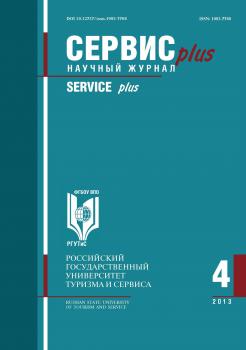Moscow, Russian Federation
Moscow, Russian Federation
The article considers the concept and essence of the service economy, shows its significance and services included in it. The main objective of the research is to study the development of the service economy in the conditions of the fourth industrial revolution. It is shown that the service economy is becoming digital. It is noted that digital technologies lead to transformations of human behavior, which is connected with fundamentally new information communications developing in the digital economy. The modern person is actively involved in the virtual space, receiving through it new information, services, acquiring goods, etc. Statistics are given about the use of Internet services. The key paradigm of the digital economy is that the main assets in it are information that generates new knowledge and human resources. The term digital service economy is introduced. The directions of introduction of digital technologies in the service economy are described, including the use of machine vision technologies, computer Internet technologies, mobile applications, etc. Special attention is paid to mobile services and their use in the field of tourism industry. It is substantiated that the development of a mobile application for a service company becomes an important element of its information support; it provides convenient communication with the client, helps attract new customers and form their loyalty. The main directions of the formation of the information infrastructure of the digital economy are considered. It is shown that the development of the digital service economy will radically change the labor market; new forms of labor organization will appear, including remote employment, crowdsourcing, etc. The digital competencies of personnel, which will need to be maintained at a high level through continuous training in the course of the whole life, will be especially important. In the service economy, there will be a substitution of a number of professions with robot-technology, new professions will appear. In the process of training personnel for the digital service economy, there should be formed such competencies as: the focus on self-development, the ability to think critically, the skills of solving nonstandard problems, adaptability, communication skills, effective teamwork, etc.
digital service economy, service, digital technologies, digitalization of business processes, tourist services, mobile applications, labor market, competencies
1. Avdeeva I.L., Analysis of the prospects for the development of the digital economy in Russia and abroad. Digital economy and industry 4.0: problems and prospects: proceedings of the scientific-practical conference with international participation. St. Petersburg: Izdatel'stvo Politekhnicheskogo universiteta, 2017, pp. 19-25. (In Russ.)
2. Lawrencenko S.A., Gladskaya I.G., Zgornik L.V., Sumzina L.V., A smart energy meter. Power Quality Management: International Conference (Moscow, 23-25 November, 2016): Proceedings. Moscow: OOO «Tsentr poligraficheskikh uslug Raduga», 2017, pp. 177-184. ISBN 978-5-905486-14-2. (In Russ.) Available at: https://t.co/eqjavwSsuY (Accessed on January 21, 2018)
3. Morozov M.A., Morozova N.S., Influence of mobile applications on the development of the tourist industry. Vestnik NAT (National Academy of Tourism), no. 4 (36), 2015, pp.17-20. (In Russ.)
4. Morozov M.A., Morozova N.S., Information technologies in the tourist industry. Moscow: Knorus, 2017, 276 p. (In Russ.)
5. Morozov M.M., Savin M.A., Marketing Communications in Social Networks as a Way to Promote a Tourist Product. Tourism and Regional Development: collection of scientific articles, issue 10. Smolensk: Universum, 2017, pp.73-76. (In Russ.)
6. Morozova N.S., Morozov M.M., Information support of the tourist business. Tourism and Regional Development: collection of scientific articles, issue 9. Smolensk: Universum, 2016, pp.60-64. (In Russ.)
7. Predvoditeleva M.D., Balaeva O.M., The main trends in the development of the Russian service sector. Marketing uslug, no. 4, 2008, pp. 248-256. (In Russ.)
8. Sizova I.L., Khusyainov T.M. Labor and employment in the digital economy: the problems of the Russian labor market. Vestnik SPbGU. Sotsiologiya, vol. 10, no. 4, 2017, pp. 376-396. (In Russ.)
9. Schwab K., The Fourth Industrial Revolution. Moscow: Eksmo, 2016, 138 p. (In Russ.)
10. Sheenko E., Stasevich O., Digital economy and Russian companies: the level of use and readiness for the transition to digital technology. Collection of scientific articles: Al-Manah "Digital Economy". Skolkovo, 2017, 127 p. (In Russ.)
11. Yakovleva E.L., Seliverstova N.S., Grigoryeva O.V., The concept of the electronic nomad: risks of the development of the digital economy. Aktual'nye problemy ekonomiki i prava, vol. 11, no. 4, 2017, pp. 226-241. (In Russ.)
12. Ericsson N. R., Economic Forecasting in Theory and Practice: An Interview with David F. Hendry. Board of Governors of the Federal Reserve System, Interna- tional Finance Discussion Paper, no. 1184, 2016.
13. Frey C.B., Osborne M. A., The Future of Employment: How Susceptible Are Jobs for Computerization? Technological Forecasting and Social Change, no. 114, pp. 254-280.
14. Morozov M.A., Morozova N.S., Attractive Tourist Destinations as a Factor of its Development. Journal of Environmental Management and Tourism, vol. 7, no. 1 (13), 2016, pp. 105-112.
15. Varian H. "Intelligent Technology. Finance and Development, no. 53 (3), 2016, pp. 6-9.
16. World Economic Forum (WEF) 2016. Digital Transformation of Industries: Logistics Industry. World Economic Forum White Paper. Prepared in collaboration with Accenture.

















